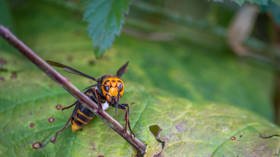America’s first MURDER HORNET nest found by scientists in Washington State (VIDEO)

Entomologists in Washington State have discovered the first Asian giant hornet nest in the US, and are planning to destroy it as an invasive species. The terrifying insects wipe out native honeybees, and can kill a human.
With a three-inch wingspan and a potent, venomous stinger, the Asian giant hornet is the world’s largest species of hornet, and a fearsome killing machine. A handful of these creatures can devastate a honeybee hive in a matter of hours, decapitating hundreds of bees before taking the hive as their own.
Also on rt.com ‘Murder hornet’ tagged with tracking device escapes as Washington state struggles to find & destroy nests before ‘slaughter phase’Entomologists with the Washington State Department of Agriculture (WSDA) first received reports of these hornets last December, and this week managed to capture two of them. The hornets were fitted with tracking devices, and the scientists stalked them back to their nest, inside a tree in Blaine, Washington.
Video shot by the WSDA shows one of the hornets emerging from the tree, its facial features clearly visible from a distance.
The rumors are true - our entomologists located the first-ever #AsianGiantHornet nest in the U.S. late yesterday. Press conference at 2 p.m. pic.twitter.com/oXuE6urXff
— WA St Dept of Agr (@WSDAgov) October 23, 2020
The WSDA plans to eradicate the nest on Saturday, potentially taking the tree with it.
The Asian giant hornet is considered an invasive pest, and should it gain a foothold in the state, the WSDA warns it will have “negative impacts on the environment, economy, and public health.”
Though these hornets do not generally attack people or pets, their stinger is longer than that of a honeybee, and contains a more toxic venom. In Japan, giant hornets kill between 30 and 50 people every year.
Come on now, this is cute! An #AsianGiantHornet enjoyed some strawberry jam after being tagged yesterday. pic.twitter.com/1nQCL3oX1w
— WA St Dept of Agr (@WSDAgov) October 23, 2020
Think your friends would be interested? Share this story!














